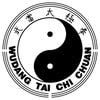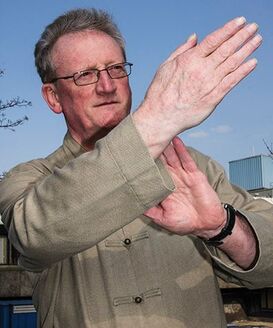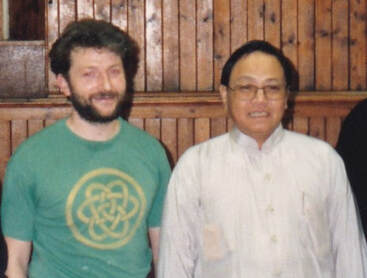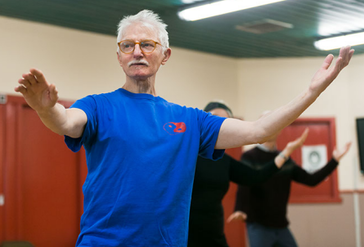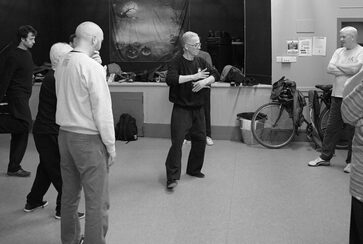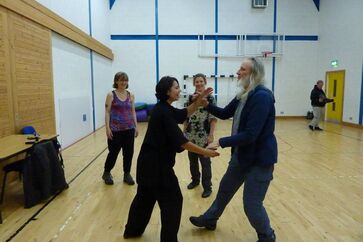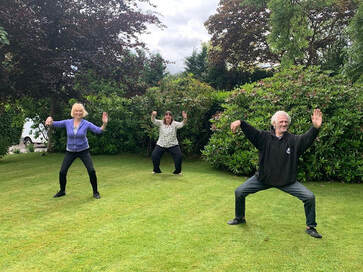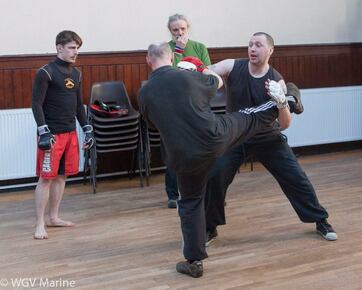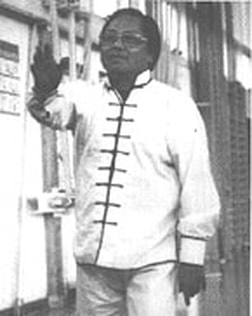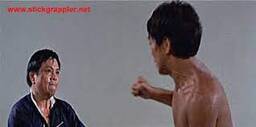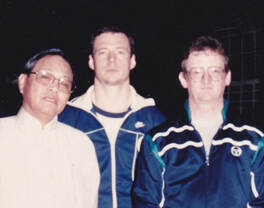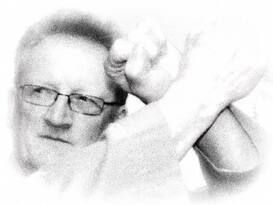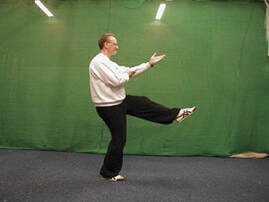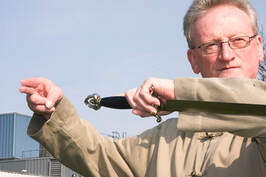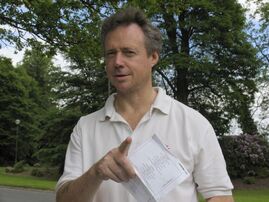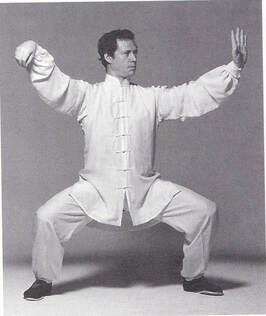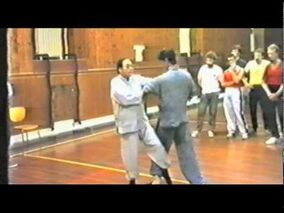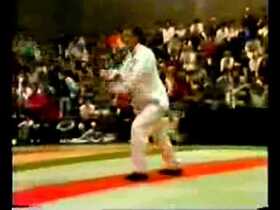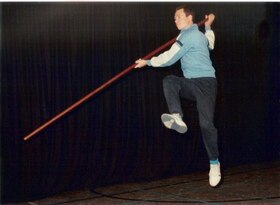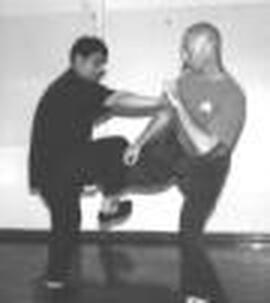|
CLASSESFoundation Beginners Class, Larkfield Neighborhood Centre, Inglefield St, G42 7AY Thursdays, 1.30 – 3pm. Cancelled due to Instructor illness Foundation Improvers Larkfield Neighborhood Centre, 39 Inglefield St., G42 7AY Thursdays, 10.30 – 12md. On Hold due to poor response!: FREE The Tai Chi classes above are health oriented, facilitating gentle exercise and encouraging relaxed, synchronized movement. The curriculum includes Qigong, Hand Form, and basic Push Hands. There is a more comprehensive and practical approach covering all five aspects of Tai Chi Chuan, Local classes can be found at – Practical Tai Chi Chuan Glasgow and Five Winds Tai Chi Chuan Glasgow |
Master Dan Docherty
Aspirations
|
Danny Doherty and Cheng Tin-Hung 1986
|
Foundation Tai Chi Glasgow is a Wu style as developed by Cheng Tin-Hung (Hong Kong), Ian Cameron (Edinburgh), and Dan Docherty (London). This lineage is also known by the names, Wutan, Wudang, Practical TCC, and Wu Cheng or Five Winds Tai Chi. The author received his teaching certificate from Ian Cameron (Five Winds Tai Chi, Edinburgh), and presented by Master Cheng Tin-Hung, Hong Kong Tai Chi Institute, in 1986, and has taught classes in Edinburgh, Dunfermline, Lancaster, Glasgow and Derry N.I. Presently he is teaching free classes in Govanhill, Glasgow. Progressing beyond Foundation Foundation Tai Chi classes are health oriented, facilitating gentle exercise and encouraging relaxed, synchronized movement. The curriculum includes Qigong, Hand Form, and basic Push Hands. If you want a more complete and martial Tai Chi I can recommended Five Winds Tai Chi and Practical Tai Chi Scotland. Five Winds Tai Chi Chuan A comprehensive curriculum covering the five aspects of Tai Chi Chuan is available through regular bi-weekly classes, focus classes and seminars, giving students flexible options, and teaching of high quality. Based in the Glasgow west & north areas, students attend from around Glasgow and beyond. Beginners and more experienced students are welcome to attend. Students begin by learning the Hand Form (Wu-Cheng style) , firstly in a broken down “square form”, and progressing to the round form. This is a “long” form, typically lasting around 15 - 20 minutes during normal practice, and is the foundation of Tai Chi learning. A number of standing exercises are also introduced early in classes. Students are progressively introduced to the eight styles of pushing hands exercises, and to free pushing. Push hands partner work is good exercise in its own right, but also supports martial learning (eg footwork, distance, first touch, weight distribution, centre of balance, soft approach). Self defence and practical application are normally studied after gaining some competence in push hands. In time, martial drills are introduced eg San Shou, Five Elements, etc, and the 48 San Shou. Beyond hand form, progress is made to weapons forms, Spear, Broad Sword & Straight Sword. Both Form and application are studied. Forms introduce new challenge in fitness and movement, and while most of us don't carry a sword around, in practical terms a brush pole, umbrella or walking stick could all be used. The final aspect is Nei kung. Practical Tai Chi Chuan Scotland Based in Glasgow South, primarily Pollokshields, with bi-weekly classes meeting in St Ninians Episcopal Church, Albert Drive. Again all five aspects of tai chi chuan are covered with a particular martial emphasis. The Principle instructor is Charles Gorrie, on PTCC he says,' There is structure, there is creativity and there is solid proven martial ability. There is no mystery, there is work and application to learning. ..' |
Cheng Tin-Hung Lineage
|
Cheng Tin Hung or Zheng Tianxiong (1930–2005) was an influential taijiquan master and the founder of "Wudang taijiquan". He was based in Hong Kong, China, and sometimes attracted controversy for his attitude and approach to the teaching and practice of his martial art. Also known as the "Tai Chi Bodyguard" for his enthusiastic defence of Taijiquan as a martial art, he took part in full contact competitions as a young man and also trained some of his students to do the same during the 1960s, '70s and '80s.
Though closely associated with the Wu school of taijiquan, he founded a separate organisation called the Hong Kong Tai Chi Association (香港太極總會). Cheng Tin Hung produced a series of books and VCDs on the subject of Taijiquan and was also involved in the production of the 1974 Hong Kong movie called The Shadow Boxer (Shaw Brothers). He appears in the opening scenes and some of his techniques were also used within the fight scenes of the movie proper. During the 1980s, Cheng Tin Hung travelled to the UK to promote Taijiquan with three of his students, Ian Cameron, Tong Chi Kin and Dan Docherty, who also produced a joint publication with him called Wutan Tai Chi Chuan. During the 1990s Cheng Tin Hung's taijiquan career slowly drew to a close with the onset of diabetes and its debilitating effects; he finally passed from this world in 2005. Ian Cameron could be considered one of the ‘elder statesmen’ of the British Tai Chi scene, being one of the few who passed the 50 years training landmark a few years ago. Ian started his early training in Hong Kong in 1971 learning under the tutelage of Cheng Tin Hung, who was a renowned teacher of tai chi as an effective martial art. A student of Judo and Karate from a young age, he was also a keen boxer as a teenager. It was during his time in the Army while serving in Hong Kong he sought out a teacher in martial Tai Chi Chuan, and became a diligent student of Chen Tin Hung. On leaving the armed forces in 1976/77 he began classes in Edinburgh, effectively introducing the style to the UK. He subsequently returned to Hong Kong in 1980 for a month, with the purpose of intensively training with Cheng. Cheng Tin Hung was then Mr Cameron's guest in Scotland the following year, and again in 1985 and 86, teaching seminars throughout the UK. Ian Cameron appeared in Hong Kong newspaper articles with Cheng during the early 70s, and was described in the acknowledgements of Cheng's best known book in the UK (Wutan Tai Chi Chuan) as the ‘elder brother in TCC ‘ of Dan Docherty, current president of the Tai Chi Union for Great Britain. Mr Cameron was a founder member of the Tai Chi Union for Great Britain, and sits as Technical Director of that body. He remains a leading practitioner and teacher of Tai Chi Chuan in the UK and continues to fervently defend the traditional approach to Cheng's system of training. Dan Docherty Soon after arriving in Hong Kong in 1975 he started training tai chi chuan under Cheng Tin Hung and within a few years was selected to represent Hong Kong in Full-contact Fighting competitions. In 1980 he won the Open Weight Division at the 5th South East Asian Chinese Pugilistic Championships in Malaysia . Dan returned to London and in 1985 he was awarded a Postgraduate Diploma in Chinese from Ealing College, London.He is now based in London and travels extensively teaching and writing about tai chi chuan. Dan is known for his strong views on the history of tai chi chuan causing upset in some circles. Dan was not only an excellent fighter, he was also a tremendous technician and theorist who strongly emphasised the use of the profound knowledge and wisdom from the Tai Chi classics. Dan understood that Tai chi has tremendous advantages as a wholistic practice, when approached in a balanced way, utilising yin and yang methods. |
Foundation
|
Foundation Tai Chi Glasgow is a Wu style as developed by Cheng Tin-Hung (Hong Kong), Ian Cameron (Edinburgh), and Dan Docherty (London).
Foundation classes are provided free in the Govanhill area of Glasgow, supported by Larkfield Community Centre and Govanhill Baths Community Trust. I started learning tai chi with Ian Cameron, Five Winds (Tai Chi Edinburgh (1982). In the mid-90s I invited Dan Docherty to Glasgow, I welcomed some of Dan's innovations and approaches to learning, particularly development of the Short Form and other aspects deemed, by some as unconventional. Some years after that I gave leadership of the class to one of Dan's student and I went off to study Baguazhang. My approach to teaching has also been influenced by formal Adult Teacher Training and my training in Gao Style Baguazhang, HsingYi, and Yiquan. Also my experience of cancer treatment and efforts to realign my life helped with experience of Meditation and Alexander Technique. Essentially I am an educator, having submitted to self-examination and formal psychodynamic supervision while studying how people learn (teacher training), and how to facilitate learning, yet acknowledging the meaningless of it all. I teach in a culturally diverse area of Glasgow and classes are free primarily because it actually costs me less to teach without payment! I was never commercially astute. |
